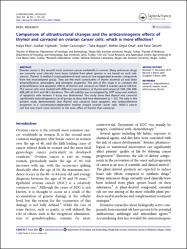Comparison of ultrastructural changes and the anticarcinogenic effects of thymol and carvacrol on ovarian cancer cells: which is more effective?

View/
Date
2020Author
Elbe, HülyaYiğittürk, Gürkan
Cavusoglu, Turker
Baygar, Tuba
Özgül Önal, Melike
Öztürk, Feral
Metadata
Show full item recordAbstract
Ovarian cancer is the seventh most common cancer worldwide in women. Many anticancer drugs are currently used clinically have been isolated from plant species or are based on such substances. Thymol (5-methyl-2-isopropylphenol) and carvacrol are oxygenated aromatic compounds from the monoterpene group. They are the main constituents of thyme essential oil and show antiproliferative, antioxidant, and antiseptic properties. The aim of this study is to compare the antiproliferative and apoptotic effects of thymol and carvacrol on SKOV-3 ovarian cancer cell line. The cancer cells were treated with different concentrations of thymol and carvacrol (100, 200, 400, 600 mu M) at 24 h and 48 h durations. The cell viability was investigated by MTT assay and analysis of apoptosis with annexin V assay was determined. The study show that thymol and carvacrol significantly induced apoptosis in all groups as dose and time-dependent (p < .05). The data in the present study demonstrated that thymol and carvacrol have apoptotic and antiproliferative properties in a concentration-dependent manner toward ovarian cancer cells. SKOV-3 cancer cell line was much more sensitive to the toxic effect of thymol than carvacrol.

















